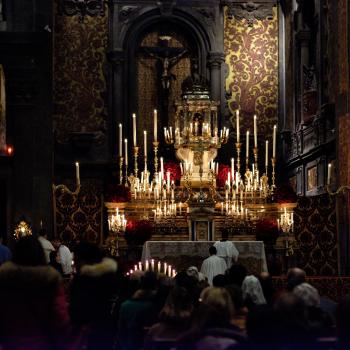A few months ago, I talked on the phone with a BBC journalist to discuss the future of religion, specifically in light of the cognitive and evolutionary sciences. Recently, the resulting article appeared at BBC Future. It tackles the decline of conventional religion in developed countries, as well as the rise of tech-focused cults – fascinating and timely topics in an era of rapid, discombobulating change.* However, the most interesting part of the article wasn’t where my quotes appeared, but the passages about a remarkable phenomenon: the growing resurgence of local, pre-Abrahamic religions in Europe and North America.
This is a complex and potentially prickly topic, but the pith of it is pretty simple. In our (sort of) post-Christian context, an increasing number of people are turning to pre-Christian religious traditions, such as Norse paganism or Druidism. In the United States, disaffected African-American activists are taking up reconstituted African faiths derived from the Yoruba tradition. Linda Woodhead, a scholar also quoted in the BBC Future article, argues that across the developed West,
There is a pull away from global universality to local identities…It’s really important that they’re your gods, they weren’t just made up.
The article’s author, Sumit Paul-Choudhury, goes on:
Woodhead points to the robust adoption of Rodnovery – an often conservative and patriarchal pagan faith based around the reconstructed beliefs and traditions of the ancient Slavs – in the former Soviet Union as a potential exemplar of things to come.
To be sure, we’re not talking about enormous demographic earthquakes just yet. Estimates for the number of adherents of Rodnovery in Russia range from just a few tens of thousands to a million or so – almost certainly less than 1% of the population, and probably a lot less. By comparison, the Russian Orthodox Church accounts for more than 40% of the Russian populace. Similarly, the United Kingdom is home to around 80,000 self-professed neo-pagans, compared to around 30,000,000 Christians.
However, the linear trends tell a different story. Only around 6 percent of Britons regularly attend church, and that number is expected to shrink to 4 percent as soon as next year. More starkly, the percentage of UK citizens identifying as Christian dropped almost twenty points between 2007 and 2016, from around 75% to 55%, while the proportion of Britons identifying as neo-pagan doubled during the 2000s.
So, while Christianity is still the predominant religion in Europe and the Americas, it’s looking demographically weak. By contrast, the neo-pagan and ethnic folk religions have real momentum in their favor. Paradoxically, the future of religion might be the past.
The Future of Religion in the Past
Now I’m going to run a thought experiment. What happens if these trends continue? Paul-Choudhury writes that one possible outcome of the decline of “Big God” world religions is just that
we simply get on with our lives. Munificent economies, good government, solid education and effective rule of law can ensure that we rub along happily without any kind of religious framework. And indeed, some of the societies with the highest proportions of non-believers are among the most secure and harmonious on Earth.
Many researchers have stated that “Big God” religions – axial-age religions with a universalizing, moralizing ethic that transcends local cultures – were like a ladder that allowed us to achieve complex societies. Now that we’ve built welfare systems and good governments, we can kick the ladder away.
But the assumption that secular societies are somehow self-perpetuating once they’ve been achieved remains untested by historical facts. The rising popularity of pre-Axial religious traditions lends some credibility to the idea that people will always tend to seek out some form of religious meaning system. So what would happen if ethnic tribal faiths became the main meaning system in complex, developed civilizations?
Let’s examine some premises and see if we can derive a couple of syllogisms to shed light on this question.
Syllogism A
Premise 1: People derive their sense of identity and cultural membership substantially from their religious beliefs.
Premise 2: “Big Gods” are religious beliefs that help sustain large-scale cooperation and social organization.
Conclusion: Big Gods enabled new, larger-scale senses of identity.
To understand this argument, let’s remember what “expanded forms of cooperation” really means. It means roads and dams and standardized weights and measures. It means social trust in currency and in the reliability of anonymous others with whom we transact business.
When you read about Big Gods, it can sometimes sound like a theory about people all getting along and holding hands and singing Kumbaya so that Yahweh doesn’t strike them down. But in reality, Big Gods means organizational sophistication and predictability. It means being able to trust that the innkeeper will hold credit on your account even though you’ll be gone for the next five months, traveling by caravan to the edge of the empire. And that trading expedition in turn depends on being able to trust other innkeepers, and on their ability to trust the value of the currency you’ll pay them in, and on the safety and security of the roads.
The kind of social coordination and prosociality that enables large-scale societies to exist is a really complicated thing. But once it exists, we start identifying with it. It becomes the foundation for a kind of meta-tribe.
Charlemagne and the Monasteries
Take Western European Christendom. The early European Middle Ages or late Dark Ages were marked by a growing, pervasive sense of membership in the community of Christendom, which extended far beyond any local language, dialect, or tribe. This isn’t to say that there weren’t intra-Christian rivalries and wars – of course there were. But as Christian society consolidated around strong political leaders such as Charlemagne, the Latin church began offering a plausible, even compelling sort of meta-identity, a universal – that is, “catholic” – community that transcended and encompassed local tribal memberships.
Why was this larger sense of identity possible? Again, it was precisely because Charlemagne and leaders like him linked Christianity to imperial political power. Monasteries were centers of commerce, agriculture, and scholarship, retaining technical and theoretical knowledge and aiding in the Carolingian Empire’s expansion:
The late eighth and early ninth centuries witnessed the expansion of Carolingian power over a vast territory that covered much of Western Europe, and monasteries were crucial in the consolidation of this power. One of the numerous policies pursued by Charlemagne and his successors to ensure the survival of their young, vulnerable Empire was the use of Christianity as a unifying force. Through conversion to a common faith, Charlemagne hoped to integrate numerous disparate groups into a Christian Empire; religion offered a framework through which the Carolingian rulers could create some semblance of a shared identity.
Another, parallel example might be the expansion of a shared Muslim identity following the Umayyad conquests in the centuries after Muhammad. Again, it’s not as if Muslims ceased fighting each other, or gave up their various tribal identities.** But the new Caliphate broadened the social horizons of its inhabitants, stoking an awareness of a wider political body of which they were now members. For those who converted to Islam, this expanded horizon was coextensive with – and inextricable from – a new religious identity and a new system of social organization.
In order words, identity, cooperation, and organization are tightly linked. If you’re a Muslim citizen of the Umayyad Caliphate, your religious and cultural identity refers to an area spanning many thousands of miles, tied together by sophisticated forms of organization and cooperation. Which leads us to:
Syllogism B
Premise 1: People’s cultural and religious identities reflect the scale of cooperation within which they exist.
Premise 2: Many postmodern people are identifying with smaller-scale or ethnic religions.
Conclusion: Many postmodern people are (incipiently) identifying with smaller-scale networks of cooperation.
The conclusion to Syllogism B is a delicate way of phrasing a difficult-to-contemplate question. In plain English, the question would be something like: “Wait, if people are reverting to older, ethnic religions, doesn’t that mean that they’re drawing down the scale of human cooperation they’re prepared to partake in?”
If this trend were to continue, I think the answer would have to be “yes.” It would be difficult to sustain the kind of extraordinary standardization, trust, and relatively effective governance that characterizes the developed world if its inhabitants begin to identify en masse with social or cultural units that are limited to specific regions or ethnic lineages.
Put even more simply, if Big Gods go away, there’s no guarantee that the societies they made possible will keep nicely chugging along.
Identity and the Scale of Cooperation
The first premise of Syllogism B above – that people identify culturally with the scale of cooperation within which they exist – is exemplified by an unlikely group: the elite class of global “citizens of the world.” This is a class of highly educated people with financial and social capital who travel frequently for business, research, or pleasure. Such people often feel more shared cultural identity with fellow members of the educated, professional class from other countries than with the less-educated residents of their own societies.
Writers who make this point usually do so critically, but I’m just pointing out that it makes perfect sense that people whose actual scale of interaction and cooperation is global should be expected to identify with a globally scaled social unit. And people who largely interact with the others in their village or their rural district should be expected to mostly identify with a village- or district-scaled social unit.
An Uncomfortable Thought Experiment
None of these insights about identity is particularly new. What’s new is taking seriously what the changes in identity and religious affiliation might practically mean for the scale of cooperation in the future.
Play out the scenario as a thought experiment. Let’s say that, in the United States, ethnic groups all began worshiping (revamped versions of) the gods and spirits of their pre-Axial cultural past. European-descended citizens turn to Norse and Germanic gods, while African-descendent Americans venerate Yoruba deities. Latin Americans pick up the old threads of Aztec, Mayan, or Incan religion, or indigenous shamanistic traditions.
We know from empirical studies and from ethnography that people trust, and preferentially cooperate with, people who share their religious commitments. So, in a big, continent-spanning country, a massive comeback of ethnic religions likely would entail a downgrading of the intensity and reliability of society-level cooperation. Networks of mutual trust could easily boil back down to the scale of ethnic in-groups. If we all convert to tribal faiths, the civilization that was built on top of larger-scale religions might have no durable foundation.
But how likely is this to happen, really? Christianity isn’t exactly dead yet, even in Europe. And even if it were, wouldn’t most post-Christians just prefer to remain secular – rejecting the gods of their ancestors in favor of no gods at all?
Who knows? In the wake of the past four years of world events, I’m not eager to make predictions anymore. The presidency of Donald Trump and the awakening of worldwide populist authoritarianism makes it seem unlikely that any recent global trends – whether secularization, globalization, or the advance of postwar liberalism – can be counted on to remain steady. Paul-Choudhury quotes me in BBC article saying “that we’re entering into a period of non-linear change in social systems.” I’m not sure of much anymore, but I am sure of that.
My objective here was only to spin a thought experiment about the growth of ethnic religious affiliations. Playing out the logic of the Big Gods hypothesis, the hypothetical large-scale return of ethnic religion seems to imply the decline of civilizational-level cooperation. There’s good reason to think that increasing numbers of people will be attracted to these faiths – Norse neo-paganism, Rodnovery, Ifa – as our previous, quasi-universalistic meaning systems continue to crumble. But whether this trend ever reaches a tipping point is not a question I can answer. And if I could know the answer, I might not want to.
___
* I have never before now actually used the gerund form of the verb “to discombobulate” in a sentence. Mark this moment for posterity.
** I just watched Lawrence of Arabia for the first time over the weekend, and if anything the movie seems to downplay the ubiquitous ethnic conflicts between different Arab and Bedouin tribes during World War I and the Arab Revolt.













